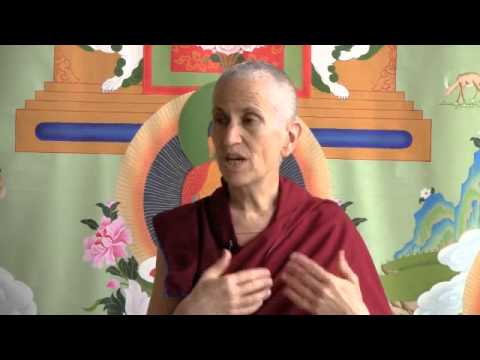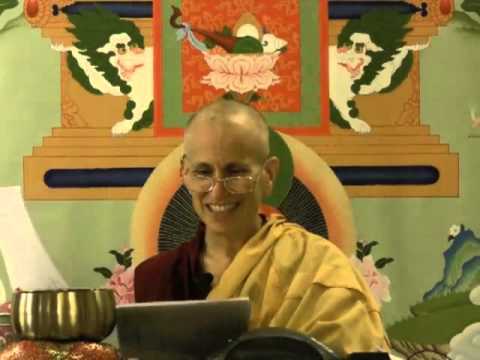White Tara at your heart
This talk was given during the White Tara Winter Retreat at Sravasti Abbey.
- Feeling filled with Tara’s wisdom, love, patience, compassion
- Doing this meditation when we’re feeling lonely, misunderstood
- Having Tara—that presence—accompany us everywhere we go
White Tara Retreat 36: Tara dissolves into you (download)
We finished our determination that we make at the end of the practice to really feel like we’ve purified and to make a determination about the way we want to live our lives. Now it’s not written here in the sadhana, but at this point, because Arya Tara’s on your head and she’s facing the same direction as you are, that she dissolves into a ball of light—because she’s made of light to start with. Again, it’s a ball of light which means you can see through it. It’s not a concrete ball of light! Then that ball of light descends through the crown of your head and comes to rest at your heart. At that point, you really feel that your mind and Tara’s mind have completely merged. So it merges. That ball of light comes to rest at the center of your chest, not your physical heart but your heart chakra. You just feel that you are filled with Tara’s wisdom, with her love, her patience, her compassion, that all the qualities that you want to have, you now have—because they’ve dissolved into you. I’m presuming you all want virtuous qualities! If you want to have a non-virtuous quality, don’t. So you really feel that you and Tara are together in that way.
New view about ourselves
This is a very good meditation when we feel lonely and when we feel misunderstood. When we want some understanding, somebody who really “gets it” about how we feel. Thinking that Tara dissolves into us and into our heart is exactly what we need because Tara does understand. She’s completely nonjudgmental, totally accepting, and compassionate, and really “gets it” about what we’re experiencing and what we need at that moment. It’s a very good time to really focus at that point and really feel fulfilled and feel understood and feel accepted. Many of us don’t know how to feel that way. Maybe it was how we were brought up or maybe just the way we are, we’re always pushing it away. Somebody says something kind about us, “Oh no, that doesn’t pertain to me.” Somebody thanks us, “Oh, I don’t deserve any thanks.” We aren’t used to even looking at ourselves with compassion or empathy or acceptance. Having Tara merge into us at that point is actually getting ourselves to take a new view about ourselves, instead of the old story of, “I’m inadequate and I’m nothing and I’m defective and I’m full of shame and blame and yuk,” because it’s not true. We really have to break those habits of thinking like that.
This isn’t a case of developing pride, “Oh, now I’m Tara, so now everybody’s going to bow down to me and I’m going to always be wonderful.” No! Come on! Tara doesn’t have that kind of attitude. Really think about what kind of attitude an enlightened being would have and what kind of qualities they would have and think that your mind merges with that. Also at that point, think that your body becomes just very clear, transparent, and light; don’t feel your body as something heavy at that point.
Nonjudgmental presence
That’s a very important way to end the meditation, with Tara dissolving at your heart. Then, when you get up from your meditation cushion and you’re walking around and doing things, you can still feel Tara at your heart. She can still be in that form of a ball of light or, if you want, she can reappear at the center of your chest, inside of you, as a small Tara, accompanying you wherever you’re going. You’re going to be more careful with your speech, you’re going to be more careful with what you do, and what you say and think. But you’re also going to feel like you have this very understanding, nonjudgmental presence. That is very important as a way to regard ourselves and as a way for us to regard other people.
Venerable Thubten Chodron
Venerable Chodron emphasizes the practical application of Buddha’s teachings in our daily lives and is especially skilled at explaining them in ways easily understood and practiced by Westerners. She is well known for her warm, humorous, and lucid teachings. She was ordained as a Buddhist nun in 1977 by Kyabje Ling Rinpoche in Dharamsala, India, and in 1986 she received bhikshuni (full) ordination in Taiwan. Read her full bio.


